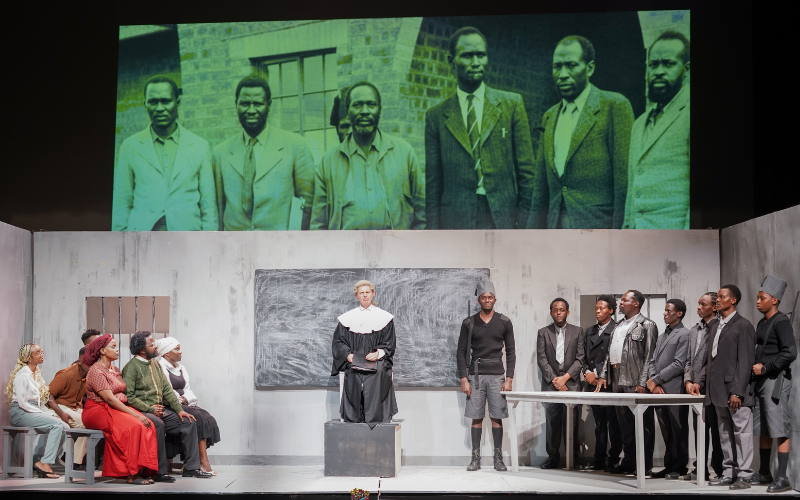A surge of interest in historical stories is drawing audiences to theatre wanting to learn about the figures who defined Kenya’s past.
For one such figure is Bildad Kaggia, whose public knowledge doesn’t go beyond his place among the Kapenguria Six— the nationalist leaders arrested in 1952 on suspicion of being a Mau Mau leader.
It’s this gap that inspired playwright John Sibi-Okumu to write Kaggia and director Stuart Nash to revive the play this October.
Nash, of Nairobi Performing Arts Studio, will present the production at the Kenya National Theatre (KNT) from October 11 to 19, staging performances in both English and Kikuyu.
The play follows the unknown story of Kaggia (played by Martin Kigondu) and his journey from his early career as a clerk in the colonial government in 1940 to his withdrawal from politics years later.
It focuses on his refusal to betray the liberation struggle, the personal cost of that decision, and his eventual life of poverty in Jericho as he was side-lined from history.
It also highlights his clashes with Jomo Kenyatta, his erasure from the national accounts, and his absence from state recognition.
The idea to write about historical figures sparked in the 1980s, when a trip to the United States introduced him to Broadway Theatre. There he encountered Fences, a 1985 play August Wilson about Black American life.
He then realised that Kenyan stories could be staged in a similar manner. His earlier works, including Role Play and Minister Karibu, explored this idea, and then reading Kaggia’s autobiography Roots of Freedom sealed his conviction with the play Kaggia.
“I saw what a fascinating fellow the man was, and I sought his family to begin writing,” he recalls.
Nash first watched Kaggia four years ago and describes it “one of the best things I’ve seen in Kenya.”
The fact that Kaggia is a little-known freedom fighter fascinated him and the most was how many young people- including the present cast of the play- knew him only by name and being one of the Kapenguria Six. This drove him to stage the play.
Nash, who also directed The Trial of Dedan Kimathi at the KNT this June, has noticed a growing appetite for Kenyan history in the theatre.
“People want to know about our history, and performing this piece also keeps Kaggia’s memory alive. Audiences will be surprised by details of his life, like his influence on the 2010 constitution, which few know about,” he notes.
Nash and Sibi-Okumu have long followed each other’s work, with their most recent collaboration being Elements in August, written by Sibi-Okumu and directed by Nash.
For Kaggia, Nash praises the playwright’s meticulous research and socially conscious writing. The production incorporates photographs of Kaggia shared by his daughter, Njoki, and explores his relationship with his wife, Wambui (played by Valentine Odhiambo), through family testimony.
Research from The Trial of Dedan Kimathi months ago also contributed to the portrayal of the Mau Mau years of Kaggia.
Nash notes the paradox of a British director staging anti-colonial productions such as Sarafina, I Will Marry When I Want, The Trial of Dedan Kimathi, and now Kaggia.
He credits the late Margaretta wa Gacheru, a veteran arts journalist, for encouraging him years ago to stage I Will Marry When I Want by Ngugi wa Thiong’o and Ngugi wa Mirii, a move that propelled him to do other plays, including Betrayal in the City by Francis Imbuga.
